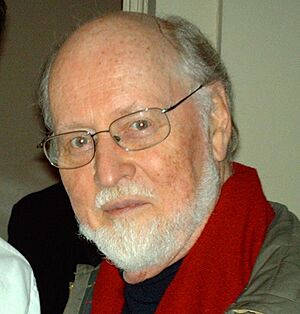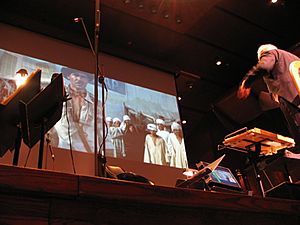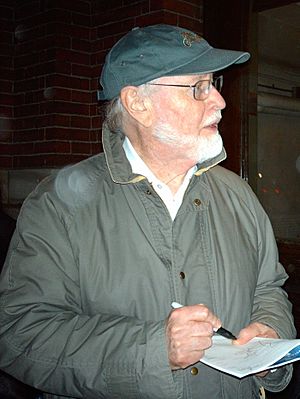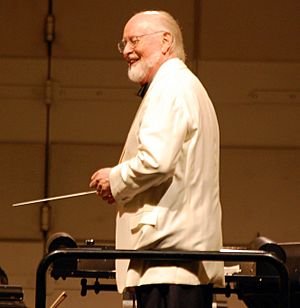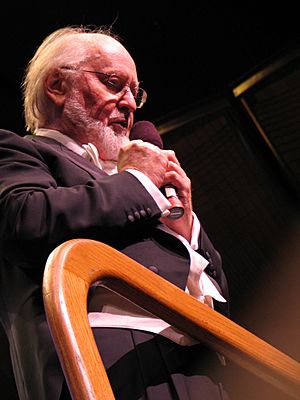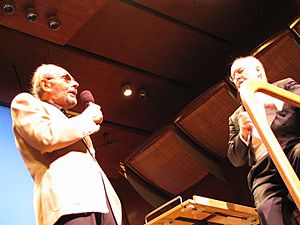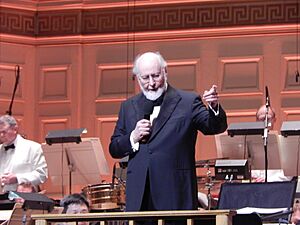John Williams facts for kids
Quick facts for kids
John Williams
|
|
|---|---|
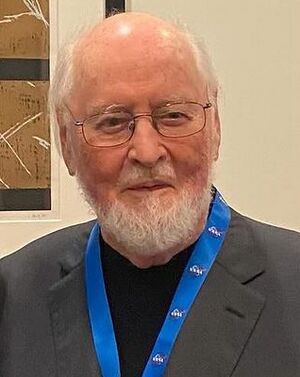
Williams in 2024
|
|
| Born |
John Towner Williams
February 8, 1932 Floral Park, Long Island, New York, U.S.
|
| Occupation |
|
| Years active | 1952–present |
|
Works
|
List of compositions |
| Spouse(s) |
|
| Children | 3, including Joseph |
| Parent(s) |
|
| Relatives | Ethan Gruska, Bobby Gruska (grandchildren) |
| Awards | Full list |
| Signature | |
 |
|
John Towner Williams (born February 8, 1932) is an American composer and conductor. He is famous for creating some of the most well-known and loved film scores in movie history. His music often blends romantic sounds with complex orchestral arrangements.
John Williams is especially known for working with director Steven Spielberg and filmmaker George Lucas. He has won many awards, including 26 Grammy Awards and five Academy Awards. With 54 Academy Award nominations, he is the second most nominated person ever, after Walt Disney. He is also the oldest person to be nominated for an Academy Award, at 91 years old.
Williams's early movie music includes Valley of the Dolls (1967) and Goodbye, Mr. Chips (1969). He started working with Steven Spielberg on The Sugarland Express (1974). He won Oscars for his music in Fiddler on the Roof (1971), Jaws (1975), Star Wars (1977), E.T. the Extra-Terrestrial (1982), and Schindler's List (1993).
Other famous movies he scored for Spielberg include Close Encounters of the Third Kind (1977), the Indiana Jones movies (starting in 1981), Hook (1991), and Jurassic Park (1993). He also composed music for Superman: The Movie (1978), the first two Home Alone films (1990–1992), and the first three Harry Potter films (2001–2004).
Besides movie scores, Williams has written many classical pieces for orchestras and solo instruments. He was the main conductor for the Boston Pops orchestra from 1980 to 1993. He also created theme music for the 1984 Summer Olympics, NBC Sunday Night Football, and the famous "The Mission" theme used by NBC News.
Williams has received many honors, like the Kennedy Center Honors in 2004 and the National Medal of the Arts in 2009. In 2022, Queen Elizabeth II gave him an honorary knighthood for his contributions to film music.
Contents
Early Life and Musical Start
John Towner Williams was born on February 8, 1932, in Floral Park, Long Island, New York. His father, Johnny Williams, was a jazz drummer. John had an older sister, Joan, and two younger brothers, Jerry and Don, who also played music.
In 1948, his family moved to Los Angeles. John went to North Hollywood High School and later studied music at the University of California, Los Angeles. In 1951, Williams joined the U.S. Air Force. He played piano and bass, and arranged music for the United States Air Force Band. He served for three years, including time at Pepperrell Air Force Base in St. John's, Newfoundland.
After his Air Force service in 1955, Williams moved to New York City. He studied piano at Juilliard. He first wanted to be a concert pianist, but then decided to focus on composing. He realized he was better at writing music than performing it. During this time, he also played piano in jazz clubs.
Beginning His Career
After his studies, Williams moved back to Los Angeles. He started working as an orchestrator at film studios. This meant he helped arrange music for orchestras. He worked with famous composers like Bernard Herrmann and Henry Mancini.
Williams also played piano as a studio musician for many film scores. One of his first jobs was for the 1956 film Carousel. He played on scores for movies like Breakfast at Tiffany's (1961) and To Kill a Mockingbird (1962). He was known as Johnny Williams during this time and even released some jazz albums.
Creating Music for Movies and TV
John Williams's music style is often described as "neoromanticism." This means it sounds grand and emotional, like music from the Romantic period. His score for Star Wars uses a technique called leitmotif. This is when a specific musical tune is linked to a character, place, or idea. For example, Darth Vader has his own theme song.
Early Success (1954–1973)
Williams wrote his first film music in 1952 for a promotional film. His first movie score was for Daddy-O (1958). He also composed music for TV shows like Lost in Space (1965–68) and Land of the Giants (1968-70).
He received his first Oscar nomination for Valley of the Dolls (1967). His first Oscar win was for Fiddler on the Roof (1971). He also scored disaster films like The Poseidon Adventure (1972) and The Towering Inferno (1974).
Working with Steven Spielberg (1974–Present)
Williams's music for The Reivers (1969) and The Cowboys (1972) impressed a young Steven Spielberg. Spielberg asked Williams to score his first feature film, The Sugarland Express (1974).
They worked together again a year later on Jaws. Williams created the famous two-note theme that signals danger. Spielberg loved it, and the score won Williams his second Academy Award. This simple, scary theme became very famous.
For Close Encounters of the Third Kind (1977), they created a special five-note tune. This tune was used in the movie as a way for humans and aliens to communicate. It was a unique musical conversation.
Williams also scored Raiders of the Lost Ark (1981). He wrote the exciting "Raiders March" for Indiana Jones. This theme, along with others, became a key part of the Indiana Jones movies. Spielberg said Williams's music helped Indiana Jones survive his adventures!
Williams's soaring music for Spielberg's E.T. the Extra-Terrestrial (1982) won him his fourth Oscar. Spielberg even edited the film to match Williams's music during the exciting chase scene.
Their collaboration continued with many more films, including Empire of the Sun (1987), Hook (1991), and Jurassic Park (1993). For Schindler's List (1993), Williams was deeply moved by the film. He won his fifth Oscar for this powerful score.
Williams also composed the music for the opening logo of DreamWorks Pictures, the film studio co-founded by Spielberg. Their work together continued with films like A.I. Artificial Intelligence (2001), Catch Me If You Can (2002), and War of the Worlds (2005).
After a break, Williams returned to score Spielberg's The Adventures of Tintin and War Horse in 2011. Both received Oscar nominations. He also scored Lincoln (2012), The BFG (2016), and The Post (2017).
In 2022, Williams scored Spielberg's personal film The Fabelmans. He also composed the music for Indiana Jones and the Dial of Destiny (2023). Williams had thought about retiring from film music, but later said he plans to keep composing for a while longer.
Star Wars and Other Famous Movies
Spielberg introduced Williams to his friend George Lucas, who needed music for his space adventure Star Wars (1977). Williams created a grand orchestral score. The Star Wars theme is one of the most recognized tunes in movie history. The "Force Theme" and "Princess Leia's Theme" are also very famous. This score was a huge success and won Williams another Oscar.
He returned to score The Empire Strikes Back (1980), introducing "The Imperial March" for Darth Vader. He also composed music for Return of the Jedi (1983). Both scores earned him Oscar nominations.
Williams also scored the three Star Wars prequel films: The Phantom Menace (1999), Attack of the Clones (2002), and Revenge of the Sith (2005). He created new themes like "Duel of the Fates" and "Across the Stars."
Williams composed music for the first three Harry Potter films. The main theme, "Hedwig's Theme", became instantly recognizable and was used in all the later Harry Potter movies too.
He returned to the Star Wars universe to score Star Wars: The Force Awakens (2015) and Star Wars: The Last Jedi (2017). He also contributed music to Solo: A Star Wars Story (2018). In 2019, he scored Star Wars: The Rise of Skywalker, completing the main nine-film saga. He even made a small cameo in the film! Williams also created the main theme for the Star Wars: Galaxy's Edge theme park attraction. In 2022, he wrote the theme music for the Star Wars TV series Obi-Wan Kenobi.
Other Notable Film and TV Works
Williams scored Alfred Hitchcock's last film, Family Plot (1976). He also composed for Superman (1978). The heroic "Superman March" and the romantic "Can You Read My Mind?" themes became iconic.
In 1985, NBC asked Williams to create music for their news programs. He composed "The Mission", which is still used by NBC today. He also worked with directors like Oliver Stone on films such as Born on the Fourth of July (1989) and JFK (1991).
Other films he scored include Home Alone (1990), Far and Away (1992), Sabrina (1995), and Memoirs of a Geisha (2005).
In 2013, Williams scored The Book Thief, which earned him more Oscar, Golden Globe, and BAFTA nominations. In 2017, he scored the animated short film Dear Basketball. In 2023, he composed "Of Grit and Glory" for the 2023 College Football Playoff National Championship.
Classical Music and Conducting
Leading the Boston Pops Orchestra
From 1980 to 1993, John Williams was the main conductor of the Boston Pops Orchestra. He was the successor to the famous Arthur Fiedler. Williams almost left in 1984 after a disagreement with some musicians, but he decided to stay.
He is now the Pops' laureate conductor, meaning he still has a special connection with them. Williams conducts the Boston Pops several times a year, especially during their Holiday Pops season and for special film music concerts.
Composing Classical Pieces
Williams has written many concert pieces. These include a symphony, a sinfonietta for wind instruments, and concertos (pieces for a solo instrument with an orchestra) for horn, clarinet, cello, flute, violin, and trumpet. His bassoon concerto, The Five Sacred Trees, was premiered by the New York Philharmonic. His "Violin Concerto No. 2" was performed by Anne-Sophie Mutter and the Boston Symphony Orchestra in 2021.
He also composed music for special events, like the Liberty Fanfare for the Statue of Liberty's rededication and themes for the 1984, 1988, 1996, and 2002 Olympic Games.
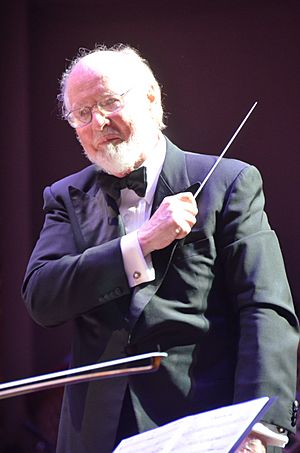
Williams often conducts the Los Angeles Philharmonic at the Hollywood Bowl. In 2009, he composed Air and Simple Gifts for the first inauguration of Barack Obama. This piece was based on the hymn "Simple Gifts" and was performed by famous musicians like Yo-Yo Ma and Itzhak Perlman.
In 2021, Williams conducted the world premiere of "Overture to the Oscars." In 2022, he wrote "Centennial Overture" to celebrate the 100th Anniversary of the Hollywood Bowl.
As a Conductor
Williams has conducted many famous orchestras, including the New York Philharmonic several times. These concerts were very popular and often sold out.
In 2022, he conducted the Philadelphia Orchestra at Carnegie Hall. In 2023, a gala was held at David Geffen Hall to celebrate his nearly 50-year collaboration with Steven Spielberg.
On April 13, 2017, Williams gave a surprise concert at Star Wars Celebration Orlando. He performed "Princess Leia's Theme" as a tribute to Carrie Fisher, "The Imperial March", and the "Main Title" from Star Wars.
In 2019, violinist Anne-Sophie Mutter and Williams released an album called Across the Stars. It featured Mutter playing themes from Williams's film scores. In January 2020, Williams conducted the Vienna Philharmonic Orchestra for the first time, performing an all-Williams concert. The album from this concert, John Williams in Vienna, became a bestseller.
Williams also conducted the Berlin Philharmonic in 2021. In 2022, to celebrate his 90th birthday, he conducted the Vienna Philharmonic again. A special tribute was held at Tanglewood with guests like James Taylor and Yo-Yo Ma. Williams made a surprise appearance at the premiere of Indiana Jones and the Dial of Destiny in June 2023, conducting themes with a live orchestra.
Personal Life
In 1956, John Williams married actress and singer Barbara Ruick. They had three children: Jennifer, Mark, and Joseph. Joseph is known as the lead singer of the band Toto. Barbara passed away in 1974. In 1980, Williams married Samantha Winslow, a photographer.
Awards and Legacy
John Williams is considered one of the most important film composers ever. His music has influenced many other composers. He has been nominated for 54 Academy Awards, winning five. He has also won 26 Grammy Awards, seven British Academy Film Awards, and four Golden Globe Awards.
Williams holds the record for the most Oscar nominations for a living person. He is also the only person to be nominated for an Academy Award in seven different decades.
In 2004, he received a Kennedy Center Honor. In 2009, he received the National Medal of Arts from the White House. In 2016, he was given the AFI Life Achievement Award. He was also inducted into the Songwriters Hall of Fame in 1998 and the Hollywood Bowl's Hall of Fame in 2000.
In 2020, Williams won a Grammy Award for his Star Wars: Galaxy's Edge Symphonic Suite. He also received his 52nd Oscar nomination for Star Wars: The Rise of Skywalker. In 2022, Queen Elizabeth II awarded him an honorary knighthood for his services to film music. In 2024, Williams received the Disney Legends award.
Concert Works
Concertos
- 1969: Concerto for Flute and Orchestra
- 1974: Violin Concerto No. 1
- 1985: Concerto for Tuba and Orchestra
- 1991: Concerto for Clarinet and Orchestra
- 1993: Concerto for Bassoon and Orchestra, The Five Sacred Trees
- 1994: Concerto for Cello and Orchestra
- 1996: Concerto for Trumpet and Orchestra
- 1997: Elegy for Cello and Orchestra
- 2000: TreeSong for Violin and Orchestra
- 2002: Heartwood: Lyric Sketches for Cello and Orchestra
- 2002: Escapades for Alto Saxophone and Orchestra (from the Catch Me If You Can film score)
- 2003: Concerto for Horn and Orchestra
- 2009: Concerto for Viola and Orchestra
- 2009: On Willows and Birches, for Harp and Orchestra
- 2011: Concerto for Oboe and Orchestra
- 2014: Prelude and Scherzo for Piano and Orchestra
- 2017: Markings for Violin, Strings and Harp
- 2018: Highwood's Ghost, An Encounter for Cello, Harp and Orchestra
- 2021: Violin Concerto No. 2
- 2025: Piano Concerto
Other Orchestral Works
- 1965: Symphony no. 1
- 1968: Sinfonietta for Wind Ensemble
- 1984: Olympic Fanfare & Theme
- 1986: Liberty Fanfare
- 1993: Sound the Bells!
- 1999: American Journey
- 2003: Soundings
- 2007: Star Spangled Banner
- 2008: A Timeless Call
- 2012: Fanfare for Fenway
- 2012: Seven for Luck for soprano and orchestra
- 2013: For 'The President's Own'
- 2014: Star Spangled Banner
- 2021: Overture to the Oscars
- 2022: Centennial Overture
- 2023: Of Grit and Glory
Chamber Works
- 1951: Sonata for Piano
- 1997: Elegy for Cello and Piano
- 2001: Three Pieces for Solo Cello
- 2007: Duo Concertante for Violin and Viola
- 2009: Air and Simple Gifts for violin, cello, clarinet and piano
- 2011: Quartet La Jolla for violin, cello, clarinet and harp
- 2012: Rounds for solo guitar
- 2013: Conversations for solo piano
- 2014: Music for Brass for Brass Ensemble and Percussion
Discography
Charting Hit Singles (U.S., Billboard)
| Year | Title | Billboard | Billboard
AC |
|---|---|---|---|
| 1975 | Main Title (Theme from "Jaws") | 32 | 22 |
| 1977 | Star Wars (Main Title) | 10 | 4 |
| 1978 | Theme from "Close Encounters of the Third Kind" | 13 | 13 |
See also
 In Spanish: John Williams (compositor) para niños
In Spanish: John Williams (compositor) para niños
- List of compositions by John Williams
- Music by John Williams, a documentary film about him
- Music of Harry Potter
- Music of Star Wars
- Music of Superman
 | Calvin Brent |
 | Walter T. Bailey |
 | Martha Cassell Thompson |
 | Alberta Jeannette Cassell |


